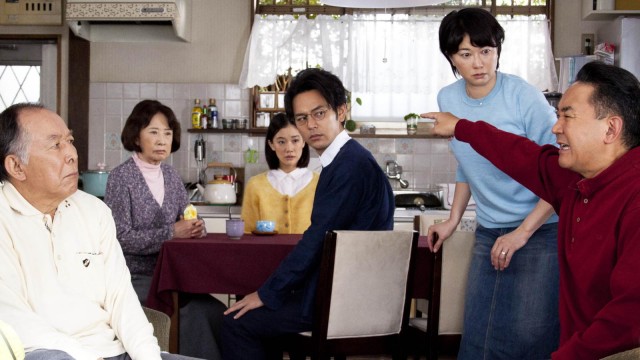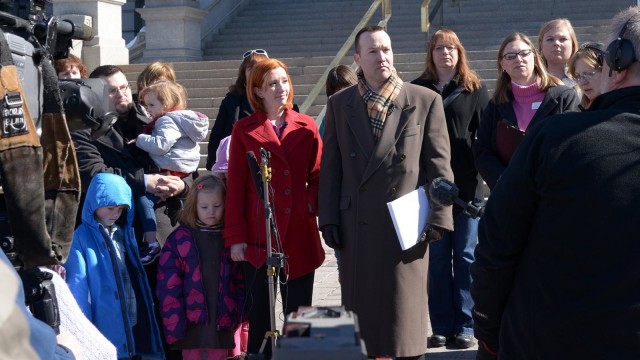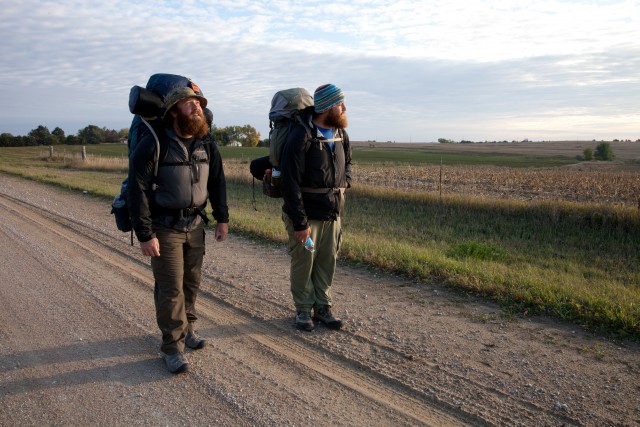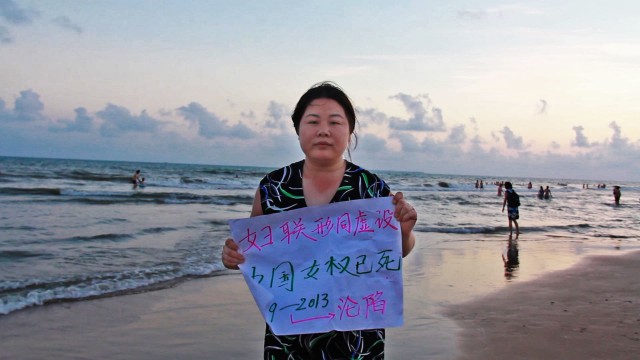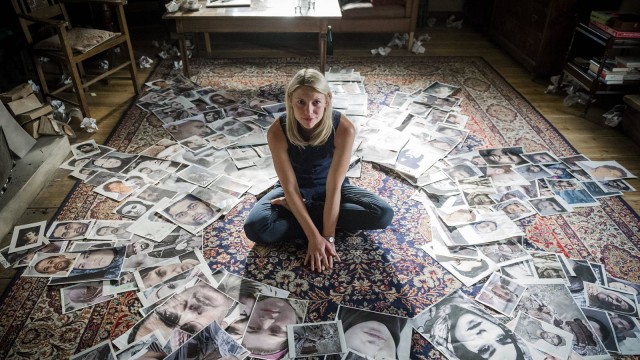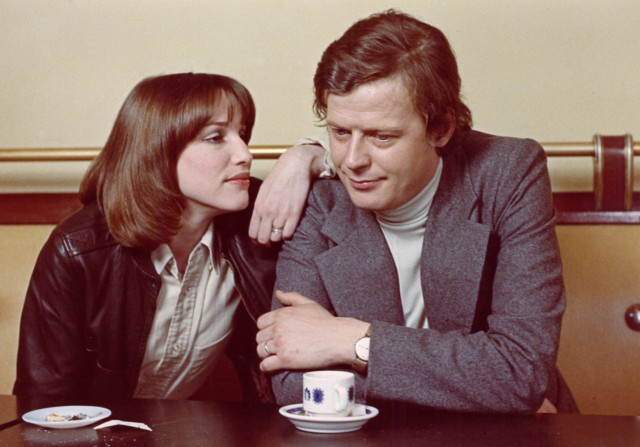
Chloé (Zouzou) and Frédéric Carrelet (Bernard Verley) develop a unique relationship in Eric Rohmer’s LOVE IN THE AFTERNOON
SIX MORAL TALES: L’AMOUR L’APRÈS-MIDI (LOVE IN THE AFTERNOON) (CHLOÉ IN THE AFTERNOON) (Eric Rohmer, 1972)
Film Society of Lincoln Center, Walter Reade Theater
144 West 65th St. between Eighth Ave. & Broadway
Nightly through September 29, 6:45 & 8:45
212-875-5050
www.filmlinc.org
 The Film Society of Lincoln Center’s “Eric Rohmer’s Six Moral Tales” concludes with the last work in the series, the 1972 drama Love in the Afternoon, which serves not only as the chronological end but the thematic finale as well. Bernard Verley stars as Frédéric Carrelet, a nearly perfect 1970s French bourgeois character. In his mid-thirties, a partner in a two-lawyer firm, he is about to have his second child with his wife, Hélène, played by his real spouse at the time, Françoise Verley, in her only feature film. While Frédéric seems at ease with his steady suburban life, he daydreams about other women, albeit with no intention of taking action. At lunch he goes to a café, watches all the passersby outside, and thinks (in voice-over narration), “If there’s one thing I’m incapable of now, it’s trying to seduce a girl. I have no idea what to say.” However, he adds, “The prospect of quiet happiness stretching indefinitely before me depresses me.” But he also admits about women, “I feel their seductive power without giving in to it.” But when an old friend from his past, the sexy and freewheeling Chloé (Zouzou), unexpectedly arrives in his office one day and starts an unpredictable yet exciting flirtation with him, Frédéric is forced to look deep inside himself and make some choices about his life that are harder than he anticipated.
The Film Society of Lincoln Center’s “Eric Rohmer’s Six Moral Tales” concludes with the last work in the series, the 1972 drama Love in the Afternoon, which serves not only as the chronological end but the thematic finale as well. Bernard Verley stars as Frédéric Carrelet, a nearly perfect 1970s French bourgeois character. In his mid-thirties, a partner in a two-lawyer firm, he is about to have his second child with his wife, Hélène, played by his real spouse at the time, Françoise Verley, in her only feature film. While Frédéric seems at ease with his steady suburban life, he daydreams about other women, albeit with no intention of taking action. At lunch he goes to a café, watches all the passersby outside, and thinks (in voice-over narration), “If there’s one thing I’m incapable of now, it’s trying to seduce a girl. I have no idea what to say.” However, he adds, “The prospect of quiet happiness stretching indefinitely before me depresses me.” But he also admits about women, “I feel their seductive power without giving in to it.” But when an old friend from his past, the sexy and freewheeling Chloé (Zouzou), unexpectedly arrives in his office one day and starts an unpredictable yet exciting flirtation with him, Frédéric is forced to look deep inside himself and make some choices about his life that are harder than he anticipated.
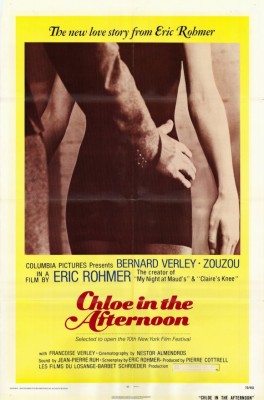
Love in the Afternoon — which should not be confused with Billy Wilder’s 1957 romantic comedy of the same name, starring Audrey Hepburn and Cary Grant, but was remade in 2007 by Chris Rock and Louis C.K. as I Think I Love My Wife — is a delightful will-he-or-won’t-he drama in which the man, Frédéric, thinks he has all the power but in fact it rests in the hands of all the women he meets, from a sexy store employee (Irène Skobline) who upsells him a cashmere button-down shirt instead of yet another drab, confining turtleneck to the two secretaries in his office, Fabienne (Malvina Penne) and Martine (Babette Ferrier), who suspect something untoward is going on, to Hélène and Chloé. Made during the women’s liberation movement, the film shows Frédéric at the mercy of all the women in his life, including those he meets on the street. At one point he imagines having a magical device that makes him irresistible to them, using it to conquer a succession of six women played by actresses from three of Rohmer’s previous Moral Tales, each described by Frédéric with one adjective: indifferent (Françoise Fabian from My Night at Maud’s), hurried (Béatrice Romand from Claire’s Knee), hesitant (Marie-Christine Barrault, My Night at Maud’s), busy (La Collectionneuse’s Haydée Politoff), accompanied (Laurence de Monaghan, Claire’s Knee), and alone (Aurora Cornu, Claire’s Knee). Frédéric is a kind of everyman, facing sin and temptation everywhere; he even accidentally catches their lovely English nanny (Suze Randall) in the buff. So he is in a constant struggle with his moral code, and that of society, while wondering if it is possible to truly love and be in love with two women at the same time. Written and directed by Rohmer, who casts no judgments on any of his characters, and photographed with a sly sense of humor by Néstor Almendros, Love in the Afternoon is a fitting end to Rohmer’s Six Moral Tales, bringing everything full circle with an absolutely grand finale. (The film is being shown twice a night through September 29 at the Walter Reade Theater, at 6:45 and 8:45, in a new 35mm restoration.)
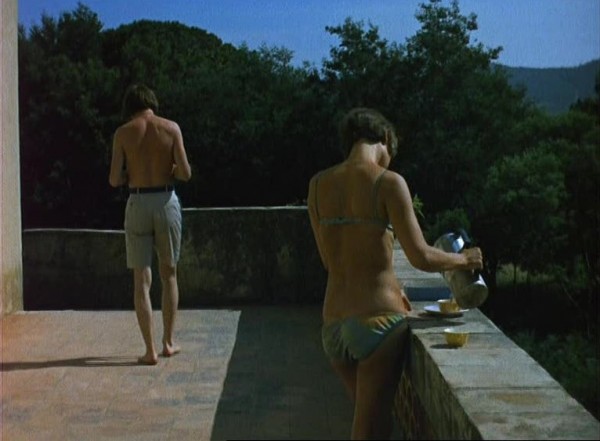
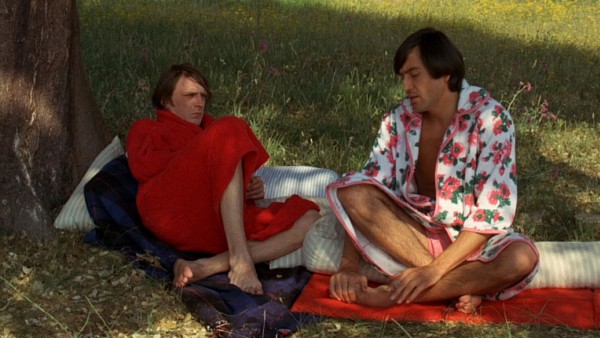
 Nominated for the Palme d’Or and a Best Foreign Language Film Oscar, My Night at Maud’s, Éric Rohmer’s fourth entry in his Six Moral Tales series (falling between La Collectionneuse and Claire’s Knee) continues the French director’s fascinating exploration of love, marriage, and tangled relationships. Three years removed from playing the romantic racecar driver Jean-Louis in Claude Lelouch’s A Man and a Woman, Jean-Louis Trintignant again stars as a man named Jean-Louis, this time a single thirty-four-year-old Michelin engineer living a relatively solitary life in the French suburb of Clermont. A devout Catholic, he is developing an obsession with a fellow churchgoer, the blonde, beautiful Françoise (Marie-Christine Barrault), about whom he knows practically nothing. After bumping into an old school friend, Vidal (Antoine Vitez), the two men delve into deep discussions of religion, Marxism, Pascal, mathematics, Jansenism, and women. Vidal then invites Jean-Louis to the home of his girlfriend, Maud (Françoise Fabian), a divorced single mother with open thoughts about sexuality, responsibility, and morality that intrigue Jean-Louis, for whom respectability and appearance are so important. The conversation turns to such topics as hypocrisy, grace, infidelity, and principles, but Maud eventually tires of such talk. “Dialectic does nothing for me,” she says shortly after explaining that she always sleeps in the nude. Later, when Jean-Louis and Maud are alone, she tells him, “You’re both a shamefaced Christian and a shamefaced Don Juan.” Soon a clearly conflicted Jean-Louis is involved in several love triangles that are far beyond his understanding, so he again seeks solace in church. My Night at Maud’s is a classic French tale, with characters spouting off philosophically while smoking cigarettes, drinking wine and other cocktails, and getting naked. Shot in black-and-white by Néstor Almendros, the film roams from midnight mass to a single woman’s bed and back to church, as Jean-Louis, played with expert concern by Trintignant, is forced to examine his own deep desires and how they relate to his spirituality. Fabian (Belle de Jour, The Letter) is outstanding as Maud, whose freedom titillates and confuses Jean-Louis. My Night at Maud’s, which is being shown September 17-18 and 24-25 as part of the Film Society of Lincoln Center’s Six Moral Tales series, is one of Rohmer’s best, most accomplished works despite its haughty intellectualism.
Nominated for the Palme d’Or and a Best Foreign Language Film Oscar, My Night at Maud’s, Éric Rohmer’s fourth entry in his Six Moral Tales series (falling between La Collectionneuse and Claire’s Knee) continues the French director’s fascinating exploration of love, marriage, and tangled relationships. Three years removed from playing the romantic racecar driver Jean-Louis in Claude Lelouch’s A Man and a Woman, Jean-Louis Trintignant again stars as a man named Jean-Louis, this time a single thirty-four-year-old Michelin engineer living a relatively solitary life in the French suburb of Clermont. A devout Catholic, he is developing an obsession with a fellow churchgoer, the blonde, beautiful Françoise (Marie-Christine Barrault), about whom he knows practically nothing. After bumping into an old school friend, Vidal (Antoine Vitez), the two men delve into deep discussions of religion, Marxism, Pascal, mathematics, Jansenism, and women. Vidal then invites Jean-Louis to the home of his girlfriend, Maud (Françoise Fabian), a divorced single mother with open thoughts about sexuality, responsibility, and morality that intrigue Jean-Louis, for whom respectability and appearance are so important. The conversation turns to such topics as hypocrisy, grace, infidelity, and principles, but Maud eventually tires of such talk. “Dialectic does nothing for me,” she says shortly after explaining that she always sleeps in the nude. Later, when Jean-Louis and Maud are alone, she tells him, “You’re both a shamefaced Christian and a shamefaced Don Juan.” Soon a clearly conflicted Jean-Louis is involved in several love triangles that are far beyond his understanding, so he again seeks solace in church. My Night at Maud’s is a classic French tale, with characters spouting off philosophically while smoking cigarettes, drinking wine and other cocktails, and getting naked. Shot in black-and-white by Néstor Almendros, the film roams from midnight mass to a single woman’s bed and back to church, as Jean-Louis, played with expert concern by Trintignant, is forced to examine his own deep desires and how they relate to his spirituality. Fabian (Belle de Jour, The Letter) is outstanding as Maud, whose freedom titillates and confuses Jean-Louis. My Night at Maud’s, which is being shown September 17-18 and 24-25 as part of the Film Society of Lincoln Center’s Six Moral Tales series, is one of Rohmer’s best, most accomplished works despite its haughty intellectualism.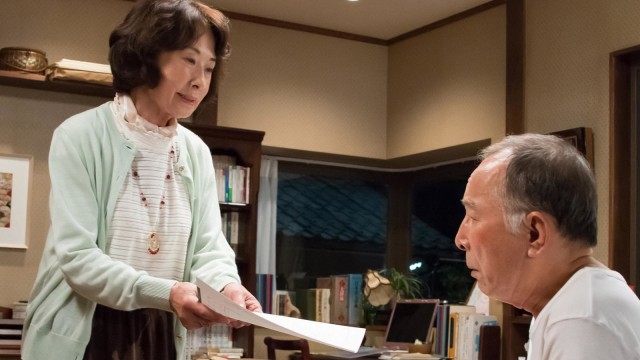
 For her birthday this year, Tomiko Hirata (Kazuko Yoshiyuki) wants something simple from her stubborn, not-very-thoughtful husband of fifty years, Shuzo (Isao Hashizume): a divorce. That shocking wish sends the entire Hirata clan into a frenzy in Yoji Yamada’s charmingly bittersweet What a Wonderful Family! The retired Shuzo doesn’t know what he’ll do without Tomiko, but he is not the kind of man to share his feelings; instead, he prefers to go to a local watering hole and flirt with the cute bartender, play golf, or take the dog, Toto, to the park. Their daughter, Shigeko (Tomoko Nakajima), is mad at her husband, Taizo Kanai (Shozo Hayashiya), for stretching the truth about one of his hobbies. Eldest son Konosuke (Masahiko Nishimura) tends not to get involved, even as his wife, Fumie (Yui Natsukawa), essentially runs the household and their children, Kenichi (Takanosuke Nakamura) and Nobusuke (Ayumu Maruyama), just run around. And youngest son Shota (Satoshi Tsumabuki) has a promising future that just might include his new girlfriend, Noriko Mamiya (Yu Aoi), although all of the divorce talk suddenly has him thinking twice.
For her birthday this year, Tomiko Hirata (Kazuko Yoshiyuki) wants something simple from her stubborn, not-very-thoughtful husband of fifty years, Shuzo (Isao Hashizume): a divorce. That shocking wish sends the entire Hirata clan into a frenzy in Yoji Yamada’s charmingly bittersweet What a Wonderful Family! The retired Shuzo doesn’t know what he’ll do without Tomiko, but he is not the kind of man to share his feelings; instead, he prefers to go to a local watering hole and flirt with the cute bartender, play golf, or take the dog, Toto, to the park. Their daughter, Shigeko (Tomoko Nakajima), is mad at her husband, Taizo Kanai (Shozo Hayashiya), for stretching the truth about one of his hobbies. Eldest son Konosuke (Masahiko Nishimura) tends not to get involved, even as his wife, Fumie (Yui Natsukawa), essentially runs the household and their children, Kenichi (Takanosuke Nakamura) and Nobusuke (Ayumu Maruyama), just run around. And youngest son Shota (Satoshi Tsumabuki) has a promising future that just might include his new girlfriend, Noriko Mamiya (Yu Aoi), although all of the divorce talk suddenly has him thinking twice.